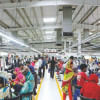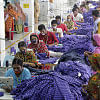Another refusal to give workers their due

"Last year saw the biggest increase in billionaires in history, one more every two days. Billionaires saw their wealth increase by $762bn in 12 months. This huge increase could have ended global extreme poverty seven times over. 82% of all wealth created in the last year went to the top 1%, while the bottom 50% saw no increase at all."
— "Reward Work, Not Wealth", Oxfam, 2018
In the past week, a few interesting things happened. For one, a report by a New York-based research firm was published, which found that Bangladesh topped the list of countries with the quickest growth of ultra-wealthy individuals. Around the same time, bringing an end to negotiations, the government fixed the minimum wage for grade-seven (entry-level) RMG workers at Tk 8,000. Not 16,000, as trade union leaders had demanded. Not Tk 12,020, as one workers-nominated representative had demanded. Nor Tk 10,028, as the Centre for Policy Dialogue (CPD) had proposed. RMG owners, who had initially proposed Tk 7,000, were reluctant to budge, and reportedly it took the prime minister's intervention to bring the figure to what has been fixed. A 51 percent increase, many have been quick to point out in awe—surely a big jump from Tk 5,300. And with this came the usual tidings of gloom and doom that we see every time workers ask for more—death of the industry which brings us 80 percent of our export earnings, apparently.
A striking contrast: the country with the fastest growth of the ultra-rich is also the country which apparently cannot pay workers, on whose labour this industry is built, a decent minimum wage which in theory should be enough to meet one's basic needs. This, too, at a time when the government had just reduced the source tax on export of apparel from 0.7 to 0.6 and corporate tax for the sector from 15 to 12 percent, giving in to RMG owners' demands! (Prothom Alo, September 11, 2018)
A report published by Oxfam on January 22, 2018, titled "Reward Work, Not Wealth", found that Bangladesh's RMG workers are the lowest paid in the world—that the wages are so low that "on average, it takes just over four days for a CEO from the top five companies in the garment sector to earn what an ordinary Bangladeshi woman garment worker earns in her whole lifetime". Indeed, a look at the minimum wages of RMG workers in countries which are our competitors in the sector shows a striking difference: Myanmar, USD 86; Pakistan, USD 124; Vietnam, USD 154; China and the Philippines, USD 160; India, USD 168; and Cambodia, USD 170 (CPD, Dialogue on Minimum Wages and Livelihood Conditions of RMG Workers). And now, after our 51 percent increase, the minimum wage of RMG workers in Bangladesh is less than USD 100.
It is enough to see what has changed since the last time the minimum wage was adjusted in 2013 at Tk 5,300 (USD 63), to realise that this wage is nowhere close to being enough. For one, the cost of living in Bangladesh has soared. And this is when we are talking about basic necessities like food and lodging. The Centre for Policy Dialogue's presentation for their proposal reveals the same scenario. Between 2013 and 2018, CPD found, the average monthly expenditure for a worker increased by 17.2 percent—an increase which our inflation rate cannot explain completely. Just the basic necessity of food expenditure rose by 11.4 percent (from Tk 5,180 to Tk 8,125). The CPD study further broke down the costs of living today according to area, and found that the average monthly expenditure varies from Tk 20,017 (in Savar) to Tk 24,846 (in Gazipur). Our own government data, as seen in Bangladesh Bureau of Statistics' (BBS) latest Household Income and Expenditure Survey 2016, shows that the total average expenditure for an household in Bangladesh is Tk 15,715. In this scenario, a minimum wage of Tk 8,000 does little to cover costs of food and living, even leaving aside other costs such as that of health, education and of course savings.
Dr Golam Moazzem of the CPD points out there is a fundamental flaw in the way minimum wage is being calculated for the RMG sector. For a proper minimum wage, one that would be a living wage, the family of the worker—that is, the number of dependents—must be considered, along with the number of effective earning members, and the provision for savings after meeting the minimum requirements. CPD's proposed minimum wage of Tk 10,028 (USD 110) was made considering that three percent of this would go to saving, with the suggestion of creation of a central provident fund for this amount. As Dr Moazzem points out, this would not only create a scope for savings for workers beyond their immediate needs, but also go hand in hand with the government's idea of creation of a universal pension scheme. Sadly, along with other proposals for consideration of child-care, education and health needs of the worker and the worker's family, this is not reflected in the new wage structure.
It is clear that the new minimum wage is nowhere close to meeting the actual needs of workers. But owners still point to the rising costs, decrease of global demand, an unskilled workforce, etc. to justify not raising the wages. However, the CPD study shows that the level of efficiency of our workers has been on the rise. Neither does the claim that entry-level workers are mostly unmarried hold ground, since most workers have to support parents or other dependents, irrespective of marital status. As for the decrease in global demands and increase of costs, Dr Moazzem, acknowledging the scenario, points out that if the minimum wages were increased, the industry would be able to stabilise itself through an increase in productivity through training, reducing inventory and investing in machinery. Brands too, many of which have committed to ensuring fair wages, could be held accountable to this. If the sector was not busy lowering costs to get the highest volume of orders, it could hold these brands accountable in the process of ensuring fair living wages. The claim that paying workers a living wage would be the end of the world for the RMG industry does not hold up, especially for a globally competitive sector such as this.
But most importantly, we must understand that the idea of a minimum wage has nothing to do with the skills or efficiency of workers, but is about the wage that must be paid irrespective of other factors for ensuring a decent living. That the RMG industry is important for our country is a fact. It earns us a big chunk of our export earnings, and employs a huge population. But the question is, if the very people whose labour fuels this industry are paid a wage far below the living wage, what good are the economic benefits that the industry brings? Our RMG "success story", if only purely from an economic analysis, has been built on cheap labour, which helped this labour-intensive sector to grow. The government has provided incentives year after year and continues to do so. Why should the government forgo tax money (which should have ultimately been used for public good) for an industry to which the labour is dispensable? If garment owners continue to see the labour abundance in the country as justification for exploitation, then ultimately this does not help the country either, and only fuels further inequality. Even leaving out considerations of human and labour rights, it should be easy to see that with only the promise of cheap labour, and without investing in workers, we can go only so far.
Moyukh Mahtab is a member of the editorial team at The Daily Star.










Comments